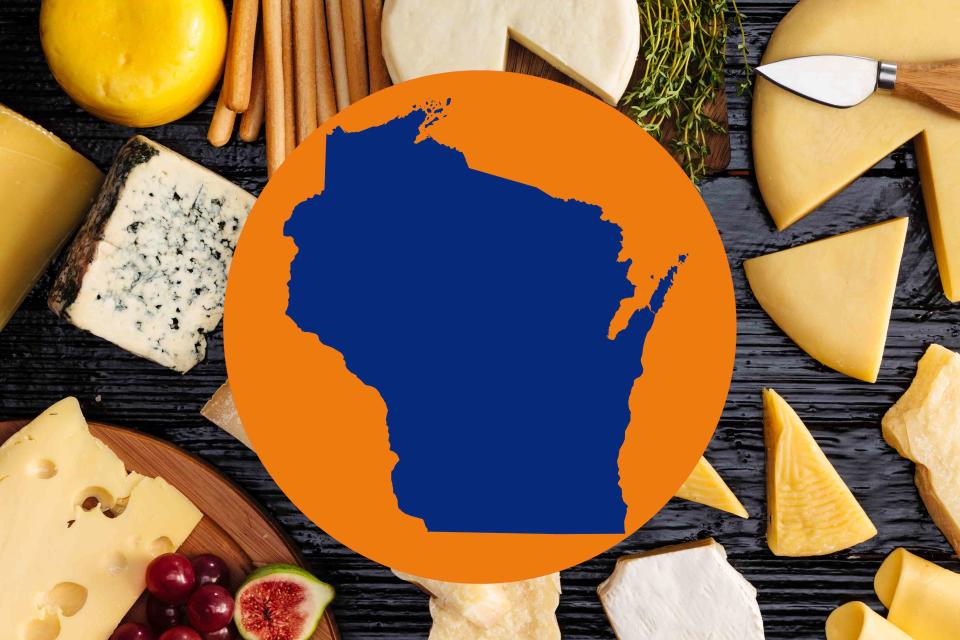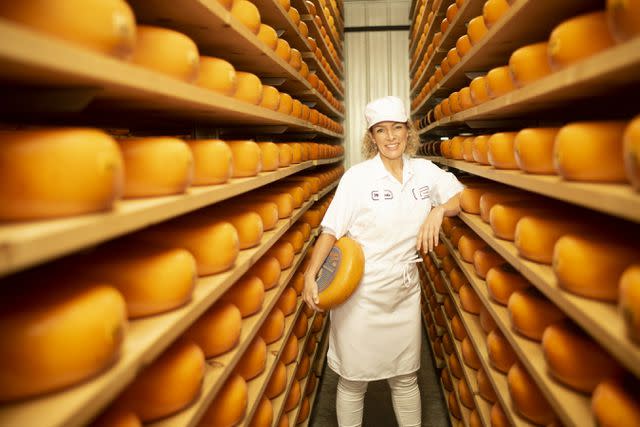This is the Only Place Outside of Switzerland That Requires a License to Make Cheese
And it can take up to two years to earn one.

Food & Wine / Getty Images
Marieke Penterman’s cheesemaking journey began with a calf.
After emigrating from the Netherlands to Thorp, Wisconsin, where her then-husband had started a 350-cow dairy farm, Penterman was seeking a career path in her new Midwestern home. During one sleepless night, in the midst of remembering to ask Dutch friends planning a visit to bring her some of the gouda missed so much, she heard a cow giving birth.
“All of a sudden the whole puzzle came together," she says. “I'm missing my Gouda, and I want to start my business.” Plus, as all the hubbub she heard in the barn reminded her, she had access to plenty of milk.
Related: I Eat 144 Pounds of Cheese a Year, and These Are the 8 Tools I Swear By
Embarking on her new career, Penterman learned that she would need a cheesemaker license. The process, which can take up to two years, is overseen by Wisconsin’s Department of Agriculture, Trade and Consumer Protection. It includes, depending on the applicant’s experience and chosen path, some variation of hands-on experience and classes that cover topics like food safety and pasteurization. And Wisconsin is the only state in the country that requires its cheesemakers to earn one.
“The cheesemaking license is about science, sanitation, and the integrity of America's Dairyland,” says Abrielle Kane, a public relations specialist for Dairy Farmers of Wisconsin. “We want high-quality milk, high-quality cheese, and we want very high standards.”
Penterman took courses, apprenticed with a local cheesemaker, and returned to Holland to learn how to make Dutch Gouda. Back in Wisconsin, she started Marieke Gouda, and just four months after making her first batch, her Foenegreek Gouda won a gold medal in the U.S. Championship Cheese Contest.
Related: It’s Official: Ina Garten’s Favorite Butter Is the Best in the World
“That really put us on the map,” she says. Nearly two decades in, Marieke Gouda has won hundreds of awards, including, in 2013, one for the best cheese in the country. On the heels of that win, Penterman’s gouda helped her become a permanent resident in the U.S. The cheesemaker was the first ever to be awarded a Green Card for “exceptional ability,” a status usually reserved for athletes, artists, actors, and scientists.
Like Penterman, Anna Landmark earned her cheesemaker license by apprenticing, and by taking courses on topics like food safety and the science of cheesemaking — a process she found beneficial.

Courtesy of the Dairy Farmers of Wisconsin
Marieke Penterman of Marieke Gouda won the most domestic awards of any United States Cheesemaker at the 2023 World Cheese Awards in Norway..“Milk is kind of a living organism, it’s always changing, based on the seasons and the animals and what they’re eating,” she says. “It was really helpful to have that kind of information, which I wouldn’t have gotten just doing an apprenticeship or working in a cheese plant.” Since earning her license a decade ago, she runs Landmark Creamery in Paoli, just south of Madison, specializing in sheep’s milk cheeses. (She also makes butter inside a micro-dairy at Seven Acres, a restored cheese factory that’s now a boutique hotel.)
Landmark praises the state’s small but mighty local cheese community, which includes several makers who she considers mentors. “I think there’s a lot of camaraderie,” she says. Nowadays, the cheesemaker is herself a mentor, coaching apprentices like Shannon Berry.
Related: The Best Cheese in America: These Are the Top 50 U.S. Cheesemakers
Armed with a culinary background, Berry is learning nuanced lessons about cheesemaking that would be difficult to learn in any other way, like how the curds should smell and feel at different points of the process. She’s also learning that it takes ample physical strength to make cheese. After a particularly strenuous day of mixing salt into curd, Berry nursed an aching back while telling her sister, “I want to let you know that anytime you taste cheese, just know that there's a cheesemaker somewhere that put everything they had into that cheese.”
Beyond the licensing program’s practical benefits, “it makes you fall more in love with the whole concept of what kind of an art it is to make cheese,” says Penterman. The Dutch-Wisconsinite is currently going through the Master Cheesemaker program — a next-level license that the Dairy Farmers of Wisconsin liken to getting a PhD in cheese. To earn one, you have to become a licensed cheesemaker, make cheese for 10 years before you can even apply, and then spend another three years going through the program. Wisconsin is the only state in the country — and the only place outside of Switzerland — where you can become a Master Cheesemaker.
Related: Where to Eat and Drink in Milwaukee, According to 'Top Chef' Finalist Dan Jacobs
While the state is home to more than 1,200 licensed cheesemakers, there’s only about 100 Master Cheesemakers. Only two have been women, and the third, Sara Griesbach, was just announced in May. Two years into the program herself, Pentermen expects to be the fourth female Master Cheesemaker in 2025.
Wisconsin is home to more than 600 types, styles, and varieties of cheese, which means near endless options for building a top-tier cheese board. According to the experts, it should include Landmark’s award-winning Anabasque, which Anna Landmark calls, “a little funky” with strong nutty notes and a nice texture. Hill Valley Dairy Luna is another must, a salty, crumbly cow’s milk studded with delicate crystals, as is micro-dairy St. Isidore’s clothbound cheddar, made using milk from a herd of 10 Jersey cows in extremely small batches by fourth-generation dairy farmer Inga Witscher.
Related: An Old Wisconsin Cheese Factory Is Now a Hotel for Dairy Lovers
One from Master Cheesemaker Chris Roelli should also be on the board, like the original-recipe Dunbarton Blue that melds the flavors of an English cheddar with blue. And of course, Marieke Gouda is a Dairyland cheese board must. The Reserve Gouda was made during COVID lockdowns. When the aging room was full, they vacuum-packed the farm’s cheese, which slows down the aging process, resulting in a supremely creamy cheese.
“There’s not another state that can build such a phenomenal cheese board with the different varieties that we have here in Wisconsin,” says Pentermen. “There is no other state that has such a wide variety of high quality and flavorful cheeses.”
For more Food & Wine news, make sure to sign up for our newsletter!
Read the original article on Food & Wine.

 Yahoo Lifestyle
Yahoo Lifestyle 
